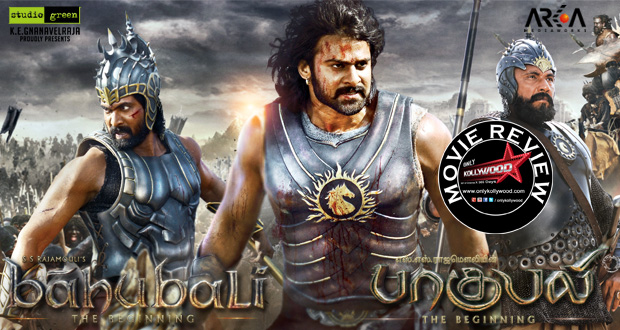Review Overview
Performances
Screenplay & Direction
Technical Aspects & BGM
A significant marker in Indian film-making!
Baahubali is a significant marker in Indian film-making for the audacity and unmatched ambition that opens up more avenues for ambitious technicians. While it can be elaborately argued that story-telling takes a backseat and visual splendor is given inexhaustible attention, the fact that Baahubali is a foresight and a benchmark in Indian cinema for its fascinatingly constructed production values with a limited budget is indisputable.
Cast: Prabhas, Rana Daggubati, Anushka, Tamanna, Sathyaraj, Naaser, Ramya Krishnan, Rohini and others
Cinematography: KK Senthil Kumar
Music: MM Keeravani
Editing: Venkateswara Rao Kotagiri
Story: KV Vijayendra Prasad
Dialogues: Madhan Karky
Art Direction: Manu Jagadh
Production Designer: Sabu Cyril
Costume Designer: Prashanti Tipirineni & Rama Rajamouli
Stunts Team: Peter Hein, Kaloyan Vodenicharov, King Solomon & Lee Whittaker
Choreography: Dinesh Kumar & Prem Rakshith
VFX Supervisor: Srinivas Mohan
Sound Designing Team: PM Satheesh & Debajit Changmai
Screenplay & Direction: SS Rajamouli
Proudced by: Arka Mediaworks
Distribution: KE Gnanvelraja’s Studio Green
Release Date: 10-07-2015
Run Time: 02:39:00
Billed as India’s most expensive film, SS Rajamouli’s Baahubali, the first part in the two-tale series, justifies on screen every single penny spent on the film. This period saga exemplifies two things elementarily: SS Rajamouli is a stout-hearted, hell of a film-maker. And, his imaginative thoughts to create escapist wartime fantasies are on par with some of Hollywood’s influential task-masters.
The story of Baahubali is straight-from-the-shoulder. It’s a simple revenge tale that we have seen in umpteen numbers of films. But, the topnotch craftsmanship with which Rajamouli has sculptured the film is something you should witness to behold.
Baahubali is a story of two brothers who clash for the control of a kingdom called Magizhmathi. There is revenge, love, action, romance (lamentably annoying), drama and ample melodrama.
Palvaalthevan (Rana Daggubati) is the brawny king who sits in the throne of Magizhmathi. Meanwhile, in Kundalathesam, Baahubali (Prabhas), his cousin, is enamored of Avanthika (Tamannah) who is part of a radical group whose only aspiration is to free Devasena (Anushka Shetty) who has been enchained for more than two decades in Magizhmathi under the command of Palvaalthevan. Devasena, who happens to be the mother of Baahubali, frantically waits for her son to rescue her. Unaware of the relationship he shares with Devasena, Baahubali vows to Avanthika to bring back Devasena from the clutches of Palvaalthevan. Will Baahubali come to the aid of Devasena? What happens when Baahubali runs into the hostile Palvaalthevan?
The first half is a complete downer, save alone the pre-interval sequence that intensifies the expectations for the second half which is the real deal. The annoyingly poetic romance portions between Tamannah and Prabhas make the proceedings go at a snail’s pace. In fact, the uninspiring fight sequence between Tamannah and Prabhas reminded me of the opulently shot skirmish between Vikram and Aishwarya Rai in Raavanan. Tamannah, for most parts, is a fish out of water compared to the other supporting cast who shine with and without armor. The character-establishment is poorly conceived with largely uninteresting sequences but once the interval block takes the center stage; we are invested to walk alongside Rajamouli’s vision which is the second half.
One thing Rajamouli has successfully managed to accomplish is to score big in the second half. His valorous attempt to transform Vijayendra Prasad’s writing into idyllic set-pieces is commendable. The 20-minute long war sequence in the climax has a nerve-wracking, sword-thwacking verve. It would not be a hyperbole to call it the best action spectacle Indian movie-making ever produced. The precision in the art work (by the ever talented Sabu Cyril), the CGI-aided battles and the adrenaline-fuelled fight choreography that is replete with galloping kicks and flying fists are translated in superb detail given the budget of the film. The slicing machetes and swinging hammers that render cinematic bloodbaths are captured brilliantly in Senthil Kumar’s skillful cinematography that takes care to shoot the action head-to-foot.
The final revelation is not up to the mark. For wide-eyed viewers, the abstract thought behind the third-act could be reasonably predictable. But, Rajamouli, overall, has pulled off to build a solid framework for the second part, which is expected to release next summer.
The performances are good. While the characters Kattapa (Sathyaraj) and Sivagami Devi (Ramya Krishnan) are dealt with good depth, Pingala Devan (Nassar) scores with his trademark quirks. Almost every single character in the film has a genuine bad-ass moment to boast. MM Keeravani’s background score is the cornerstone of this tent-pole blockbuster. A major part of the film, especially some poorly written sequences, rides effortlessly on his thumping score.
While it can be elaborately argued that story-telling takes a backseat and visual splendor is given inexhaustible attention, the fact that Baahubali is a foresight and a benchmark in Indian cinema for its fascinatingly constructed production values with its limited budget (compared to Hollywood) is indisputable.
Despite its shortcomings, Baahubali is a significant marker in Indian film-making and SS Rajamouli’s career for the audacity and unmatched visualization that opens up more avenues for ambitious technicians.
Baahubali Movie Review Rating: 4/5
Written by Surendhar MK
